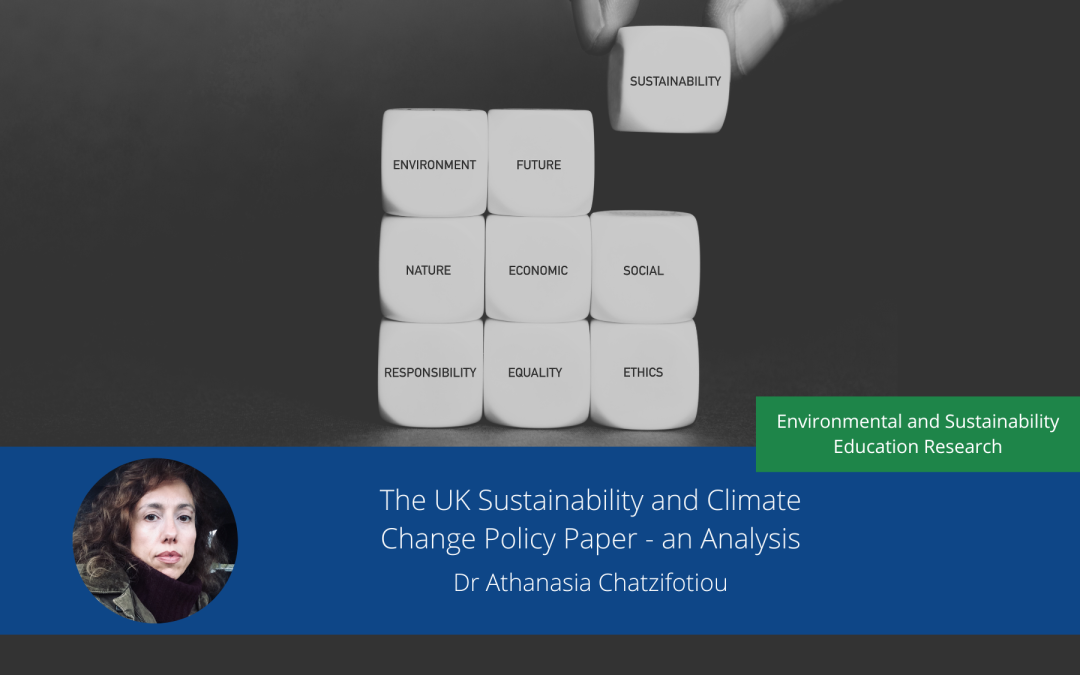
The UK Sustainability and Climate Change policy paper – An analysis
In April 2022, the UK Department for Education (DfE) published a policy paper laying out a strategy for the education and children’s services systems on the topic of sustainability and climate change. Dr Athanasia Chatzifotiou, Senior Lecturer at the University of Sunderland in the UK took a closer look at the policy paper to help us understand its provisions and proposals.
Key Messages
- The Strategy identifies the importance of sustainability and climate change aiming to reach teachers and other professionals engaged in a variety of children’s service systems.
- The Strategy has limitations that emanate from the language used and its actual content that is not presented in a clear and coherent manner for different stakeholders.
- The Strategy acknowledges the DfE’s role in sustainability, and it promotes mainly knowledge on its environmental aspect (e.g. focus on biodiversity, outdoor/nature knowledge, etc.). The social aspects of sustainability are hardly addressed, and the economic ones are presented as job opportunities.
- The Strategy takes into consideration important policies, and national and international initiatives but it fails to show how these can inform the action areas and initiatives that drive the Strategy.
- The Strategy does not enable practitioners to facilitate a thorough climate and sustainability education where both socio-economic and socio-scientific issues can be taken into consideration.
The Strategy

The policy paper Sustainability and climate change: a strategy for the education and children’s services systems (referred to as the Strategy onwards) should be welcomed. It had been missing from the wider political and educational context (Greer, King and Glackin, 2021).
The Strategy identifies the importance of sustainability and climate change and is aimed at teachers and other professionals engaged in a variety of children’s service systems. Aside from the positive note upon its entry, however, the Strategy has limitations. These limitations emanate from the language used and its actual content that is not coherently presented for different stakeholders (e.g. teachers, civil servants etc.). For instance, the vision presented aims to make the UK ‘…the world-leading education sector in sustainability and climate change by 2030’, but the Strategy applies to England only. This rhetoric is accompanied by principles (e.g. ‘..we will seek opportunities to work with others… Evidence will be at the heart of our activity… we will make the greatest impact. We will adopt a systems-based approach…’, etc.) that are hard to argue against, but it is also hard to see how these aims will be achieved. These limitations are discussed below in relation to the general provisions the Strategy makes and to climate education in particular.
The Strategy’s provisions

The Strategy acknowledges the DfE’s important role in all aspects of sustainability. It highlights the overall aim of reducing our environmental footprints in accordance with achieving Net Zero. Net Zero is the ‘umbrella’ UK policy for decarbonising all sectors of the UK economy by 2050. However, there is a focus on environmental sustainability that creates a disequilibrium among the social, economic and environmental aspects. This also favours the country’s economic goals rather than its educational or environmental ones (Dunlop and Rushton, 2022).
While the Strategy acknowledges the DfE’s role in sustainability, its focus centres upon knowledge (e.g. biodiversity, outdoor/nature knowledge, etc.). Rushton and Dunlop (2022, p.3) identified a similar issue arguing that the Strategy: “…is on learning more about…not empowering young people to act for the environment or challenging the root cause of climate change.” This is evident in the Strategy’s identified Action areas (five in total) and initiatives (three in total).
The Actions are:
1) Climate Education,
2) Green Skills and careers,
3) Education Estate and Digital Infrastructure,
4) Operations and Supply Chains and
5) International
The initiatives are:
1) the National Education Nature Park (a virtual nature park)
2) the Climate Leaders Award (similar to other awards like the John Muir Award, Duke of Edinburgh’s Award, etc.)
3) Sustainability Leadership (noting support from senior management leadership).
Within the above, the social aspects of sustainability are barely identified, and the economic ones are presented as job opportunities. For instance, the Action area ‘Green skills and jobs’ highlights only the potential number of green jobs that will be created and nothing more; the Action area ‘Education Estate and digital technology’ contains information around heating solutions, water scarcity, etc. that links them to school buildings without clearly showing the role of teachers and children in these.
Even though the Strategy takes into consideration important policies, national and international initiatives (e.g. the United Nations’17 Sustainable Development Goals and UNESCO’s ‘Education for Sustainable Development (ESD), the Paris Agreement and Glasgow Climate Pact, the United Nations Convention on the Rights of a Child (UNCRC), the UK Climate Change Act (2008), etc.), it fails to show how these can inform the action areas and initiatives that drive the strategy. An example of such failure can be seen with the initiative National Education Nature Park. The focus seems to be mostly on environmental knowledge (e.g. ‘deliver improvements in biodiversity, contribute to the implementation of the nature recovery network, etc.); a ‘trend’ that shows in other counties as well (Monroe, Plate, Oxarart, Bowers and Chaves, 2019). Nowhere is visible how the 17 SD goals or the Convention on Children’s Rights can inform the above in a manner that professionals can make a change. The focus on environmental knowledge is prevalent throughout the Strategy including climate education.
Action Area 1 – Climate Education

I want to focus on Climate Education (Action Area 1) because the proposals are for children to learn about nature, the cause and impact of climate change and the importance of sustainability. These suggestions reflect once more an approach to ‘learning about’ rather than empowering action. Admittedly, the latter is much more difficult to achieve, especially in an educational context where mainly discipline and conformity are promoted amongst pupils.
The Strategy highlights particular National Curriculum subjects (e.g. science, geography, etc.) that can promote such learning from early years onwards. It highlights the GCSEs (General Certificate for Secondary Education) in design and technology, food preparation and nutrition, and economics as topics that can further enhance the importance of learning about sustainability while at the same time, it announces a new natural history GCSE by 2025 for ‘deeper knowledge of the natural world’.
This interest in knowledge is further enhanced by the proposed annual Climate Literacy Survey from 2022 to benchmark progress in improving the climate knowledge of school leavers. Knowledge is important, but Rushton and Dunlop (2022) identified that teachers and students alike were asking for more critical thinking, doing research, taking action, communicating and networking with others. Knowledge alone does not necessarily lead to environmental action (Skamp, Boyes and Stannistreet, 2009). Still, the Strategy sees science knowledge as most fitting for climate education. This is reflected in science teachers’ Continuing Personal Development (CPD) and on developing a Primary Science Model Curriculum to include ‘an emphasis on nature to ensure all children understand the world’.
This ‘knowledge overload’ manifests itself in the implicit alignment that the Strategy brings between Climate Education and Education for Sustainable Development. However, throughout the Strategy there is neither a clear distinction between the two nor any links made for teachers to see how they relate to each other.
Climate change and political impartiality

Finally, and most disappointingly, the section on Climate Education closes with a message on political impartiality.
The message, amongst other things, says: “Teaching about climate change, and the scientific facts and evidence behind this, does not constitute teaching about a political issue and schools do not need to present misinformation or unsubstantiated claims to provide balance.”
Climate education is a socio-scientific issue (Henderson, Long, Berger, Russell, and Drewes, 2017) and as such it carries socio-political dimensions. A systematic review of effective education strategies in climate change education highlighted a distinction between ‘just the facts’(that is, ‘learning about’) and ‘also the actions’ approaches which refer to an apolitical and a political approach to the issue of climate change education (Monroe et.al, 2019).
When priority is given to ‘just the facts’, then the socioeconomic dimensions of climate and sustainability education – which are explicitly included in the United Nations Sustainable Goals – are compromised. Scholars like Gayford and Dillon (1995) have clearly shown since the ‘90s the dilemmas and difficulties that teachers face when teaching environmental issues precisely because they span through all domains (social, economic, physical). There needs to be a balance between the scientific information and the value-laden nature of climate and sustainability education. This kind of balance is missing from the said Strategy.
Conclusion
The Strategy has given schools an opportunity to consider their sustainability and climate education approaches. In a way, it is contributing towards ‘spreading the word’ on the importance of educating and acting upon environmental and climate issues. Acquiring scientific knowledge about these issues is paramount; but also of paramount importance are the socio-economic dimensions of these issues.
Other blog posts on similar topics:

Dr Athanasia Chatzifotiou
Senior Lecturer, University of Sunderland, UK
Athanasia Chatzifotiou gained her Ph.D. from Durham University in the UK. She examined primary school teachers’ knowledge and awareness of environmental education in two European countries, namely England and Greece. Her subsequent work addressed issues concerning the status of education for sustainable development in the National Curriculum in England and Greece, policy initiatives in England, the Eco-school approach in early years and primary schools, etc. She teaches in the BA Hons Childhood Studies degree at Sunderland University where she is a Senior Lecturer in the Department of Social Sciences.
References and further reading
Department for Education, (2022). Policy paper: Sustainability and climate change: a strategy for the education and children’s services systems. Retrieved from: https://www.gov.uk/government/publications/sustainability-and-climate-change-strategy/sustainability-and-climate-change-a-strategy-for-the-education-and-childrens-services-systems
Dunlop, L. and Rushton, A.C. (2022). Putting climate change at the heart of education: Is England’s strategy a placebo for policy? British Education Research Journal. https://doi.org/10.1002/berj.3816
Dunlop, L. and Rushton, A. C. (2022). Five ways the new sustainability and climate change strategy for schools on Englabd doesn’t match up to what young people actually want. The Conversation, https://theconversation.com/five-ways-the-new-sustainability-and-climate-change-strategy-for-schools-in-england-doesnt-match-up-to-what-young-people-actually-want-181966 [Accessed 5/4/2023]
Gayford, C. and Dillo, P. (1995). Policy and the practices of environmental education in England: a dilemma for teachers. Environmental Education Research, v.1, p.173-183.
Greer, K. King, H. and Glackin, M. (2021). The ‘web of conditions’ governing England’s climate change education policy landscape, Journal of Education Policy, DOI: 10.1080/02680939.2021.1967454
Henderson, J. Long, D. Berger, P. Russell, C. and Drewes, A. (2017). Expanding the foundation: climate change and opportunities for educational research. Educational Studies, v.53, n.4, p.412-425. DOI: 10.1080/00131946.2017.1335640
Monroe, M. Plate, R. Oxarart, A. Bowers, A. and Chaves, W. (2019). Identifying effective climate change education strategies: a systematic review of the research, Environmental Education Research, 25:6, 791-812, DOI: 10.1080/13504622.2017.1360842
Skamp, K. Boyes, E. Stannistreet, M. (2009). Global warming responses at the primary secondary students’ beliefs and willingness to act. Australian Journal of Environmental Education, v. 25, p.15-30
